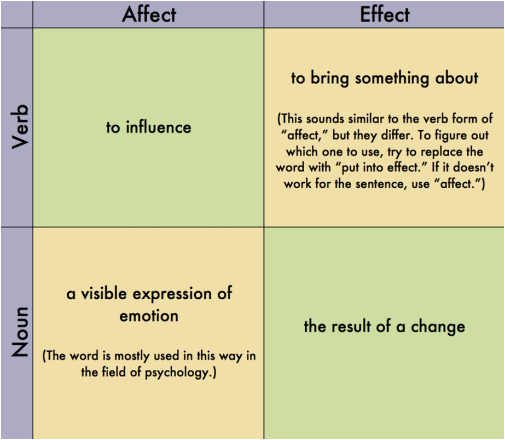|
3/18/2015 2 Comments How Ef-fectionateTwo words that are often mistaken for one another are “affect” and “effect.” Most of the time, the difference between the two words is explained by applying noun status to "effect" and verb status to "affect." It's a little more complex than that, though, and I’d like to present a simple chart that illustrates not only the commonly used meanings but the secondary meanings that make a rigid affect=verb / effect=noun rule inaccurate. The green boxes are "all systems go." These are the meanings you're most likely looking for when you use each word. If you're using it as a verb, you probably want "affect." If you're using it as a noun, you probably want "effect." Caffeine has a strong effect on me. ("effect" is usually a noun) However, you also might not. And that's what the yellow boxes are: "proceed with caution." Because there is a noun form of "affect" and a verb form of "effect," and these—especially the latter—contribute to the difficulty so many people have with remembering which is which. Let's talk about the noun form of affect first. It's a term used mostly in psychology to refer to emotion, especially a visible expression of emotion. For instance, psychologists talk about people (particularly those with certain disorders or disabilities) having a "flat affect," meaning they aren't expressing emotion. This doesn't mean they don't feel it, necessarily, but their voices and poker faces sure aren't betraying it if they do. In this case, the word is actually pronounced "AFF-ect," rather than with the accent on the second syllable as with all the other words here. Then there's the verb form of effect, and this is a bit harder to differentiate from affect. The definition is "to bring about a change." How is this different from "to influence," which I've given as a definition of "affect"? My personal guideline is that when you're unsure which to use in the sentence, replace "a/effect" with the phrase "put into effect" (you might have to push some other words around a little) and see if it says what you want it to. Thus: The manager wants to ______ the new schedule. If you fill the blank with "effect," then the sentence needs to mean the same thing as "The manager wants to put the new schedule into effect." If that's what you're trying to say, then voila, there's your choice. If, however, you fill it with "affect," then your sentence will mean, "The manager wants to influence the new schedule"—that is, the manager wants to have an influence on it, perhaps putting Clair on the late shifts and Cliff on the early ones. The difference is subtle but important. You could also effect a compromise (put the compromise into effect), effect change (put [a] change into effect), or effect a plan (put the plan into effect). The word "affect" would make grammatical sense in each of these examples, but it wouldn't mean the same thing. Incidentally, the most common verb phrase with "effect" is probably "effect change." Let's try a different kind of example. This lack of sleep is starting to ______ my health. This one is almost definitely going to be "affect." Why? Because trying to make "effect" make sense here requires a stretch of logic. Apply the "put into effect" test and you get: "This lack of sleep is starting to put my health into effect." Whether you're in good health or bad health, it's safe to say you've been experiencing some kind of health all this time. You can quickly reject "effect" as a valid option unless you're trying to be surreal.
Meanwhile, "This lack of sleep is starting to affect my health" means just what it says: that the speaker's health is being influenced (probably adversely) by a lack of sleep. There are, of course, additional definitions for both "affect" and "effect," but these are the most common uses and are thus the ones that trip people up the most. In any case, I hope you find that this post (pause for effect) affects your writing and that you can effect these suggestions!
2 Comments
5/1/2023 07:46:11 am
I wanted to express my gratitude for your insightful and engaging article. Your writing is clear and easy to follow, and I appreciated the way you presented your ideas in a thoughtful and organized manner. Your analysis was both thought-provoking and well-researched, and I enjoyed the real-life examples you used to illustrate your points. Your article has provided me with a fresh perspective on the subject matter and has inspired me to think more deeply about this topic.
Reply
5/1/2023 09:13:09 am
I wanted to express my gratitude for your insightful and engaging article. Your writing is clear and easy to follow, and I appreciated the way you presented your ideas in a thoughtful and organized manner. Your analysis was both thought-provoking and well-researched, and I enjoyed the real-life examples you used to illustrate your points. Your article has provided me with a fresh perspective on the subject matter and has inspired me to think more deeply about this topic.
Reply
Leave a Reply. |
Archives
March 2017
CategoriesAuthorI'm Lea, a freelance editor who specializes in academic and nonfiction materials. More info about my services is available throughout this site. |


 RSS Feed
RSS Feed
